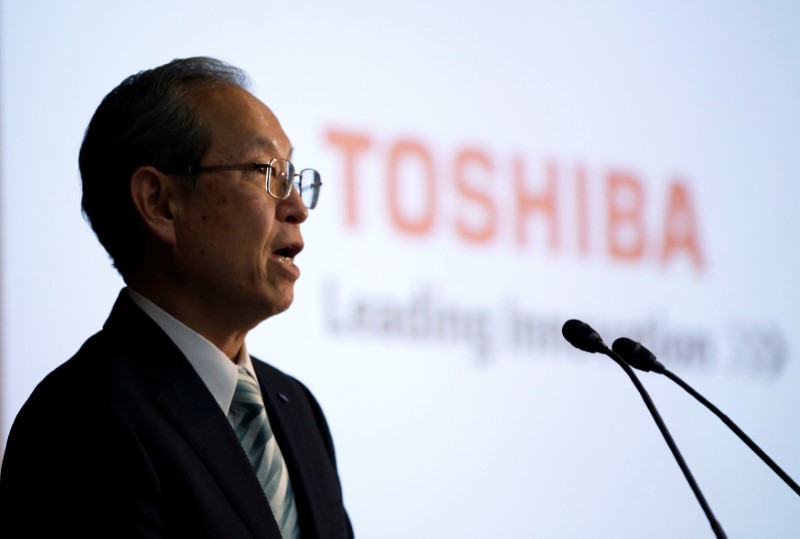By Makiko Yamazaki
TOKYO (Reuters) - Cash-strapped Toshiba Corp (T:6502) has staved off delisting after its accounting won auditor approval, albeit with a stern rebuke, leaving its listed status largely dependent on whether it can complete the stalled sale of its chip business by March.
The Japanese conglomerate, as a listed entity, was required to file last year's finances by June, but delayed due to disagreements with its auditor about multi-billion dollar losses at now-bankrupt U.S. nuclear power subsidiary Westinghouse.
"It's cleared the first hurdle," said Makoto Kikuchi, chief executive at Myojo Asset Management. "The second hurdle will involve negotiating the sale of its chips unit, currently in dispute. There's still a risk it will not be able to fix its excess liabilities, and be delisted."
PriceWaterhouseCoopers Aarata LLC (PwC) on Thursday gave a "qualified opinion" on Toshiba's financial results for the year ended March as well as for April-June, meaning it broadly vouched for books that contained minor problems.
But in a rare move, PwC also issued a separate "adverse opinion" on corporate governance, saying Toshiba was late in booking Westinghouse losses.
A split opinion is almost unheard of, sources previously told Reuters. Market watchers had been bracing for a damning yet straightforward verdict after a local newspaper two weeks ago reported that PwC was considering an adverse opinion only.
A sole adverse opinion could have prompted the 140-year-old firm's delisting. That would have damaged its creditworthiness just as it scrabbles for funds to pay debt and cover the impact of $6.3 billion in liabilities linked to Westinghouse.
NEGATIVE WORTH
Toshiba, which admitted in 2015 to inflating profits over seven years, has resorted to seeking cash through the sale of its cash cow flash memory business valued at $18 billion - a business that made up 93 percent of April-June operating profit.
Adding urgency to the chip sale, Toshiba needs funds to avoid ending a second consecutive financial year with negative net worth, where liabilities exceed assets. Back-to-back years of negative worth is also grounds for delisting.
The sale has been complicated by Western Digital Corp (O:WDC), a partner in Toshiba's main chip plant, taking Toshiba to court arguing any sale requires its consent. The U.S. firm has also made an offer for the business.
Toshiba's preferred bidder - a consortium of Japanese government-backed funds, U.S. private equity firm Bain Capital LP and South Korean chip maker SK Hynix Inc (KS:000660) - has insisted disputes are settled before completing the deal.
Regulatory approval for any sale is likely to take several months, meaning Toshiba must reach a conclusion within weeks to seal the deal by the close of the business year, analysts said.
"We still believe it's possible to close by the end of March and are making our utmost efforts," Chief Executive Officer Satoshi Tsunakawa said at an earnings briefing. "We haven't decided what to do if those efforts fail."
Tsunakawa also said, as well as plugging the hole left by its nuclear power unit, Toshiba has to shore up a natural gas business that "is still a risk".
Toshiba in 2013 agreed to buy 2.2 million tonnes annually of liquefied natural gas from 2019 for 20 years - an agreement made when gas prices were high. A price drop has exposed Toshiba to nearly $10 billion in potential charges over the 20-year period.
PRESSURE
PwC replaced Ernst & Young ShinNihon as Toshiba's auditor after the 2015 accounting scandal.
It said some Westinghouse-related losses booked in the year through March 2017 should have been recorded the previous year. Toshiba said it disagreed. People familiar with the matter said the pair have been wrangling over the issue for months.
If the losses were booked as per PwC's opinion, last year would have been Toshiba's second year of negative worth, rather than its first.
The auditor's unusual two-part verdict comes at a time when the government is encouraging companies to improve corporate governance, to attract foreign investment.
"The government's determined to avoid a Toshiba delisting and so really piled on the pressure," said a person familiar with the matter, without disclosing the nature, source or recipient of the pressure.
A PwC official told Reuters the firm was confident about its audit.
Separating opinions on finances and governance may be rare, but the case indicates corporate scandals in Japan are being dealt with more stringently than in the past, said Hideaki Miyajima, a Waseda University professor and expert on corporate governance.

"You could say there's been a step forward, given how long the auditors dragged things out and that they went for any kind of adverse opinion at all."